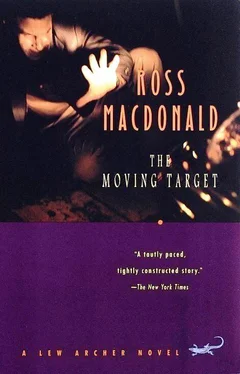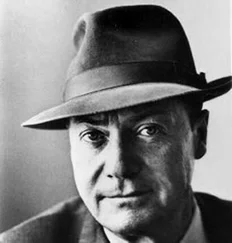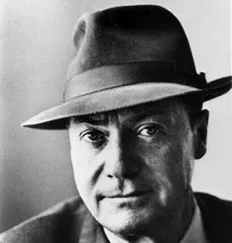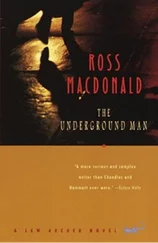“I’ve seen her more than once with an English-remittance-man type.”
“Description?”
“White hair, premature, eyes blue or gray. Middle-sized and wiry. Well-dressed. Handsome if you like an aging chorus boy.”
“You know I do. Anybody else?” I couldn’t show him Sampson’s picture or mention Sampson’s name. He was paid for collecting names in groups of two. Very badly paid.
“Once at least. She had late supper with a fat tourist-type dressed in ten-dollar bills. He was so squiffed he had to be helped to the door. That was several months ago. I haven’t seen her since.”
“And you don’t know where she lives?”
“Somewhere out of town. It’s off my beat. Anyway, I’ve given you a fin’s worth.”
“I won’t deny it, but there’s one more thing. Is Simeon Kuntz working now?”
“He’s doing an independent on the Telepictures lot. She might be out there. I heard they’re shooting.”
I handed him his bill. He kissed it and pretended to use it to light a cigarette. His wife snatched it out of his hand. When I left they were chasing each other around the kitchen, laughing like a couple of amiable maniacs.
My taxi was waiting in front of the apartment house. I took it home and went to work on the telephone directories for Los Angeles and environs. There was no Fay Estabrook listed.
I called Telepictures in Universal City and asked for Fay Estabrook. The operator didn’t know if she was on the lot; she’d have to make inquiries. On a small lot it meant that Fay was definitely a has-been where pictures were concerned.
The operator came back to the telephone: “Miss Estabrook is here, but she’s working just now. Is there a message?”
“I’ll come out. What stage is she on?”
“Number three.”
“Is Simeon Kuntz directing?”
“Yes. You have to have a pass, you know.”
“I have,” I lied.
Before I left I made the mistake of taking off my gun and hanging it away in the hall closet. Its harness was uncomfortable on a hot day, and I didn’t expect to be using it. There was a bag of battered golf clubs in the closet. I took them out to the garage and slung them into the back of my car.
Universal City wore its stucco facades like yellowing paper collars. The Telepictures buildings were newer than the rest, but they didn’t seem out of place among the rundown bars and seedy restaurants that lined the boulevard. Their plaster walls had a jerry-built look, as if they didn’t expect to last.
I parked around the corner in a residential block and lugged my bag of clubs to the main entrance of the studio. There were ten or twelve people sitting on straight-backed chairs outside the casting-office, trying to look sought-after and complacent. A girl in a neat black suit brushed threadbare was taking off her gloves and putting them on. A grim-faced woman sat with a grim-faced little girl on her knee, dressed in pink silk and whining. The usual assortment of displaced actors – fat, thin, bearded, shaven, tuxedoed, sombreroed, sick, alcoholic, and senile – sat there with great dignity, waiting for nothing.
I tore myself away from all that glamour, and went down the dingy hall to the swinging gate. A middle-aged man with a chin like the butt end of a ham was sitting beside the gate in a blue guard’s uniform, with a black visored cap on his head and a black holster on his hip. I stopped at the gate, hugging the golf bag as if it meant a great deal to me. The guard half opened his eyes and tried to place me.
Before he could ask anything that might arouse his suspicions, I said: “Mr. Kuntz wants these right away.”
The guards at the majors asked for passports and visas and did everything but probe the body cavities for concealed hand grenades. The independents were more lax, and I was taking a chance on that.
He pushed open the gate and waved me through. I emerged in a white-hot concrete alley like the entrance to a maze and lost myself among the anonymous buildings. I turned down a dirt road with a sign that said “Western Main Street,” and went up to a couple of painters who were painting the weather-warped front of a saloon with a swinging door and no insides.
“Stage three?” I asked them.
“Turn right, then left at the first turn. You’ll see the sign across the street from New York Tenement.”
I turned right and passed London Street and Pioneer Log Cabin, then left in front of Continental Hotel. The false fronts looked so real from a distance, so ugly and thin close up, that they made me feel suspicious of my own reality. I felt like throwing away the golf bag and going into Continental Hotel for an imitation drink with the other ghosts. But ghosts had no glands, and I was sweating freely. I should have brought something lighter, like a badminton racquet.
When I reached stage three the red light was burning and the soundproof doors were shut. I set the golf bag down against the wall and waited. After a while the light went out. The door opened, and a herd of chorus girls in bunny costumes came out and wandered up the street. I held the door for the last pair and stepped inside.
The interior of the sound stage was a reproduction of a theater, with red plush orchestra seats and boxes, and gilt rococo decorations. The orchestra pit was empty and the stage was bare, but there was a small audience grouped in the first few rows. A young man in shirt sleeves was adjusting an overhead baby spot. He called for lights, and the baby spot illuminated the head of a woman sitting in the center of the first row facing a camera. I moved down the side aisle and recognized Fay before the light went out.
The light came on again, a buzzer sounded, and there was a heavy silence in the room. It was broken by the woman’s deep voice: “Isn’t he marvelous?”
She turned to a gray-mustached man beside her and gently shook his arm. He smiled and nodded.
“Cut!” A tired-looking little man with a bald head, beautifully clothed in pale-blue gabardines, got up from behind the camera and leaned toward Fay Estabrook. “Look, Fay, you’re his mother. He’s up there on the stage singing his heart out for you. This is his first big chance; it’s what you’ve hoped and prayed for all these years.”
His emotional central European voice was so compelling that I glanced at the stage involuntarily. It was still empty.
“Isn’t he marvelous?” the woman said strenuously.
“Better. Better. But remember the question is not a real question. It is a rhetorical question. The accent is on the ‘marvelous.’”
“Isn’t he marvelous!” the woman cried.
“More accent. More heart, my dear Fay. Pour out your mother love to your son singing so gloriously up there behind the footlights. Try again.”
“Isn’t he marvelous !” the woman yelped viciously.
“No! Sophistication is not the line. You must keep your intelligence out of this. Simplicity. Warm, loving simplicity. Do you get it, my dear Fay?”
She looked angry and distraught. Everyone in the room, from assistant director to prop man, was watching her expectantly. “Isn’t he marvelous?” she said throatily.
“Much, much better,” said the little man. He called for lights and camera.
“Isn’t he marvelous?” she said again. The gray-mustached man smiled and nodded some more. He put his hand over hers, and they smiled into each other’s eyes.
“Cut!”
The smiles faded into weary boredom. The lights went out. The little director called for number seventy-seven. “You may go, Fay. Tomorrow at eight. And try to get a good night’s sleep, darling.” The way he said it sounded very unpleasant.
She didn’t answer. While a new group of actors was forming in the wings of the theater stage and a camera rolled toward them, she rose and walked up the central aisle. I followed her out of the gloomy warehouse-like building into the sun.
Читать дальше












